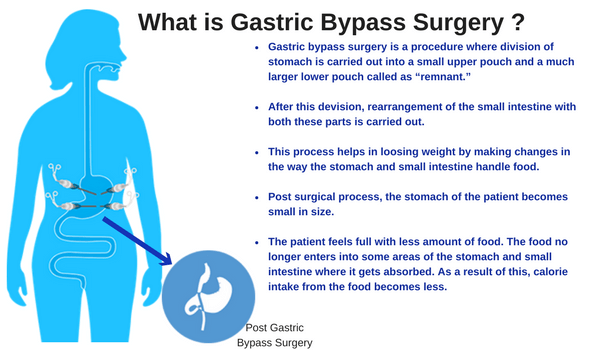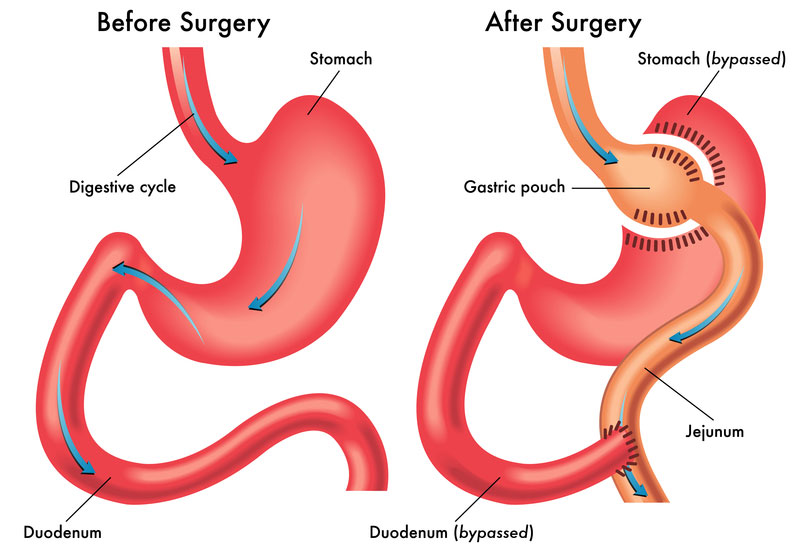Gastric Bypass Surgery
Listed below is the step by step procedure of gastrc bypass surgery:
- What is Gastric Bypass Surgery?
- Why is Gastric Bypass Surgery Required?
- Pre-operative Preparation
- Day Before Surgery
- Procedure Day
- Methods/Techniques of Gastric Bypass Surgery
- Post Procedure
- Risks and Complications
- FAQs
What is Gastric Bypass Surgery ?
Gastric bypass surgery is a procedure where division of stomach is carried out into a small upper pouch and a much larger lower pouch called as “remnant.†After this devision, rearrangement of the small intestine with both these parts is carried out. This process helps in loosing weight by making changes in the way the stomach and small intestine handle food. Post surgical process, the stomach of the patient becomes small in size. The patient feels full with less amount of food. The food no longer enters into some areas of the stomach and small intestine where it gets absorbed. As a result of this, calorie intake from the food becomes less.

Why is Gastric Bypass Surgery Required?
Gastric bypass surgery is carried out for obese people with inability to loose weight in natural way by making changes in the diet and exercise.
Gastric bypass surgery is recommended in following cases:
- Patients with a basic metabolism index (BMI) of 40 or more. The range of normal BMI is 18.5 to 25
- People suffering from obstructive sleep apnea
- Patients of type 2 diabetes
- Heart patients
Suitability of the patients for undergoing gastric bypass surgery is determined by the surgeon based on the BMI and other health conditions. Whether the patient will get benefited from weight-loss surgery or not is decided in advance.
Even though it is a weight loss surgery, gastric bypass surgery is not a quick fix for weight problems. There are drastic changes in the lifestyle after gastric bypass surgery. Approximately 65 to 80% of excess body weight is reduced by gastric bypass operations as per medical reports.
Pre-operative Preparations
Prior to surgical process, patients need to undergo some tests. These tests are given below.
- Basic physical examination
- Blood tests
- Ultrasound test of gallbladder
- Basic health check for suitability for operation
- Testing for underlying medical conditions
- Counseling session about nutrition
Apart from these tests, patients will be given basic knowledge about what will happen during the surgery.
Prior to few days of surgery, patients need to quit smoking and should not continue it post surgery. This needs to be followed strictly since it can affect recovery process. Surgeon needs to know if the patient is pregnant or planning to become pregnant prior to the gastric bypass surgery. Patient's medication recored is also important to be discussed with the surgeon. Any allergies or problems need to be reported. This helps to avoid complications during and post surgery. Prior to surgery, the patient might have to stop medicines containing Aspirin or Warfarin, if they are taking any such medicines.
Day before Surgery
The record of all tests need to be kept handy to avoid complications during the surgery. Basic information regarding surgery is given to the patient and his/her close relatives. Diet instructions need to be followed.
Procedure Day
On the day of surgery, patient needs to maintain proper hygiene. Jewelery and other valuables need to be kept away by the patients. Basic details about the post surgery possibilities will be informed to the patient. A test for anesthesia is conducted prior to the surgery to avoid complications. After successful results, anesthesia is given to the patient.
Methods/Techniques of Gastric Bypass Surgery
Once the patient becomes unconsciousness after getting an anesthesia, the surgeon makes 4 to 6 small incisions in his/her stomach. Through these incisions, instruments are inserted while performing the surgery. A camera is attached to a monitor which helps in getting image details to the surgeon. An inner view of abdomen can be seen by the surgeon with the help of this camera.

Gastric bypass surgery is carried out by an open surgery method or with the help of laparoscope. A laparoscope is a device with a small camera which helps monitoring the images during the surgery.
Given below are the main steps involved in the gastric bypass surgery.
- First step involves reducing the size of the stomach of the patient. This is done by dividing the stomach in upper and lower sections. This division makes the top section of the stomach shorter where food enters. This section is of walnut size which can hold food of 28 grams capacity. This makes the patient eat less food which ultimately reduces weight.
- In second step, bypass is carried out. The connection of a part of small intestine is made with a small hole in the pouch. The food after eating will travel from this pouch into new opening and then directly into small intestine of the patient. Less intake of food results into lesser consumption of calories.
Post Procedure
In general, 1 to 4 days of hospitalization is required post surgery. A catheter is attached to the stomach which goes through the nose of the patient. This catheter helps in draining the fluids from the stomach of the patients. A catheter is connected to the bladder for removal of urine.
Post surgery, patients may not be able to eat easily. After 1 to 3 days, they can have liquids and later soft and pureed foods. The part of stomach which has undergone bypass surgery may have a catheter for drainage of fluids.
Special kind of stockings are given to the patients for prevention of blood clot formation. Medications are given for the same purpose.
Pain medications are given for getting relief from the pain. Usually these are given by an intravenous route. Pain medication can cause constipation. Patients will be given suggestions for reducing constipation before leaving the hospital.
Upon being able to eat food properly without vomiting, a patient can get discharged from the hospital. Once health condition of the patient is satisfactory, discharge is given.
Following factors need to be focused on by the patients after surgery.
- Hydration: Enough hydration is required for the patients after gastric bypass surgery. Water intake along with food intake needs to be given importance.
- Sleep: For first few weeks after surgery, enough sleep is very important for the patients. It helps in faster recovery.
- Bath: It is advised to take shower post surgery only after complete healing of incisions. This prevents infections. Complications associated with incisions, such as pus formation, drainage and foul smelling odor need to be informed to the surgeon in time.
- Follow-up: After a week of surgery, follow up needs to be started. Staple to the skin can be removed during the follow up.
- Diet: Usually fluids and shakes are suggested to the patients after gastric bypass surgery.
Given below are the diet suggestions for the patients of gastric bypass surgery.
- Liquid meals
- Low carbohydrate shakes
- High protein foods
- Enough water intake
- Small portion of vegetables
Risks and Complications
Being a major surgery, gastric bypass can lead to various types of risks. Initially, risks can occur as a result of anesthesia which include breathing problems, infection, Bleeding, blood clots and allergic reactions.
Risks for gastric bypass are listed below.:
- Poor nutrition
- Gastritis
- Heartburn
- Stomach ulcers
- Scarring inside the belly
- Stomach injury
- Intestinal injury
- Vomiting after eating more than the capacity of stomach pouch
Complications after gastric bypass surgery include:
- Anastomotic leakage
- Anastomotic stricture
- Anastomotic ulcer
- Dumping syndrome
- Nutritional changes
- Nutritional deficiencies
FAQs
- What happens to the unused portion of the stomach after gastric bypass surgery?
A. The part of stomach which remains “dormant†keeps producing acids and enzymes that aid digestion process. This does not have any negative effect on the health of the patient.
- Is there any connection between pregnancy planning and gastric bypass surgery?
A. Women are advised to wait for at least one year before planning to get pregnant. It is very important to maintain healthy body prior to pregnancy. This helps for healthy pregnancy and avoids complications.
- How nausea is treated in the patients after gastric bypass surgery?
A. Patients need to evaluate their food habits. Eating less or in excess can cause nausea. Any unusual symptoms need to be reported in time so that the surgeon and dietitian can recommend suitable diet plan. This helps in early recovery without feeling anxious. In some cases, psychological therapy can be useful as well.
More information related to Gastric Bypass Surgery
Cost of Gastric Bypass Surgery in India and top cities
List of best Gastro Surgeons in India and top cities
List of best Bariatric Surgeons in India and top cities
List of best Laparoscopic Surgeons in India and top cities
List of best Gastroenterology Hospitals in India and top cities

